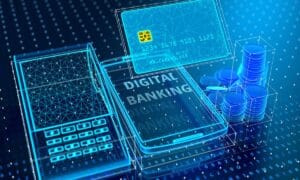A number of frequently asked questions or FAQs about digital banking are answered in this article. Part 1 covers FAQs #1 to 7. Part 2 covers FAQs #8 to 10.
If you want to invest as an expat or high-net-worth individual, which is what I specialize in, you can email me (advice@adamfayed.com) or use WhatsApp (+44-7393-450-837).
We recommend that most wealthy locals and expats invest offshore, and we can help with that.
Digital Banking Guide
FAQ #1: What is an Online Bank?
Other terms for online banks include digital banks, internet-based banks, virtual banks, neobanks, and others. Online banks are financial institutions that perform their operations on the internet. In other words, clients control their accounts through a computer or mobile device app.
The majority of online banks do not have physical locations. There are, however, some hybrid banks that have both physical branches and internet divisions. Because they do not incur the costs involved with developing and managing a network of branches, digital banks may offer reduced fees and better interest rates to their clients.
They also invest in customer service because there are no branches where customers can walk in and get their concerns resolved. As a result, all communication between the consumer and the bank must take place through online chat support, phone call, or email.
FAQ #2: What is the Difference Between Digital Banking and Online Banking?
Many people interchange these terms. Online and mobile banking are both forms of digital banking. Customers use online banking to complete transactions, but they may also do their banking using a smartphone app, thus mobile banking. As a result, online banking and mobile banking are both digital banking functions.

FAQ #3: What is Digital Banking?
Digital banking entails the use of technology such as artificial intelligence (AI) to digitalize the complete front-to-back end of banking. Financial institutions can use the technology to automate processes such as administrative tasks and data processing. Indeed, the goal of adopting such know-how is to reduce manual chores on a daily basis.
Digital bank account holders wish to make transactions, such as deposits and money transfers to and from their accounts from anywhere in the world. They want access to customized money management services and to be able to apply for loans online.
Digital-only banks, also known as neobanks, cater to the demands of these tech-savvy customers. They are designed in a way that goes beyond typical banking in the United States.
FAQ #4: What Impact Has Digital Banking Had on Financial Institutions?
The increased customer demand for efficiency was one of the numerous factors that contributed to the birth of digital banking. They want sophisticated methods for executing financial transactions and obtaining banking information without having to visit a local branch.
On the other hand, the digital banking transformation began with only a few online banking options. Institutions later entered the digital-only market.
FAQ #5: How to Pick an Online Bank
Aside from interest rates and costs, there are numerous other variables to consider when selecting a digital bank. Comparing virtual banks based on the following criteria will help you identify the greatest fit for your banking requirements. Among these are:
APYs: Choosing a bank with a high APY will help you make the most out of your money. Interestingly, online banks pay greater interest rates on their financial products; nevertheless, select the one that offers the greatest rates, lowest costs, and other benefits.
ATM Network: Customers who value access to their money should opt for online banks with a large fee-free ATM network. Search for a bank with an ATM near your residence or areas you frequent, such as malls, supermarkets, and so on.
Convenience: When compared to traditional banking, people prefer digital banking since it is more convenient. Customers can use the bank’s website or mobile app to communicate with them. You may read customer reviews online to get a sense of what to anticipate from your preferred online bank.
Customer Service: Most online banks do not have or have limited branch access. As a result, while comparing online banks, keep customer service in mind. So seek for a bank that can be reached via phone, chat, email, or other means.
Fees: Monthly costs, ATM fees, and overdraft fees should all be cheap with the finest online bank. It’s even better if the bank reimburses third-party ATM fees. You may start by analyzing your banking habits to identify which costs you can avoid and which you won’t be able to avoid. Then look for an online bank that will assist you cut these costs to a bare minimum.
Minimum balances and deposit requirements: Online banks make it simple to run an online account by requiring smaller minimum balances and deposits. These types of incentives boost your financial security.
Products: A reputable online bank should offer a wide range of financial services. A full-service financial institution, on the other hand, is the finest since it provides savings, checking and money market accounts, and other products.
Safety: All banks in the US are regulated by the Federal Deposit Insurance Corporation (FDIC). As a result, your selected online bank should be FDIC-insured. This will safeguard you in the event that the bank goes bankrupt.
FAQ #6: Is Online Banking Secure?
Online banks use the same stringent security measures as their physical counterparts. Your money is secure as long as the digital bank displays Member FDIC logo in its banking products or is simply a member of the FDIC. If a bank doesn’t have such a logo, your funds are at danger.
The Federal Deposit Insurance Corporation (FDIC) has been insuring deposits up to $250,000 since 1933. Savings accounts, certificate of deposit accounts, checking accounts, and money market deposit accounts are insured by FDIC.
Money deposited with a credit union are not insured by the FDIC. Credit unions are covered by the National Credit Union Administration (NCUA) which provide similar insurance as FDIC.

FAQ #7: What are the Advantages of Using an Online Bank?
Lower Fees: On average, online banks charge $2.61 for checking accounts, whereas traditional banks charge $6.44, despite the fact that this type of account does not yield interest. In addition, users of digital banks must maintain a lower average balance and deposit a lesser sum to open an online account to avoid maintenance costs. Overdraft costs, online bill payment fees, and insufficient funds fees are all lowered for them.
Higher Interest Rates: Because they don’t have physical branches to maintain, digital banks may offer higher interest rates than traditional banks. As a result, they pass on those savings to their clients in the form of higher interest rates. Furthermore, branch-based banking only gives higher interest rates on checking accounts to encourage clients to open more of them due to the high costs of banking.
More Convenient: Digital banking gives you the ability to transact anytime and wherever you choose. You don’t have to go to the bank and wait in line to make a transaction. Instead, you just access your online account through a website or mobile app on your device at any time of day or night as long as you have an internet connection.
Premium Customer Service: Because they don’t have any physical branches to worry about, digital banks invest more on customer service. Customers can contact customer service through online message centers and toll-free phone numbers.
More Secure Sites: Most individuals are afraid about hackers when it comes to using an online bank account; yet, conventional institutions face equal concerns. Customer data is now routinely stored in large data centers. As a result, internet hackers have the ability to infiltrate an online bank in the same manner that they do a traditional bank. Additionally, both online and traditional banks are members of the Federal Deposit Insurance Corporation (FDIC). As a result, if a customer’s funds are stolen, they may be able to recover up to $250,000.
Continue to FAQs About Digital Banking – Part 2 for more answers to FAQs about digital banking.
Pained by financial indecision? Want to invest with Adam?

Adam is an internationally recognised author on financial matters with over 827million answer views on Quora, a widely sold book on Amazon, and a contributor on Forbes.



